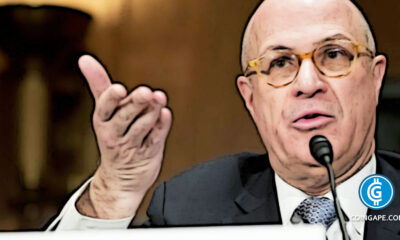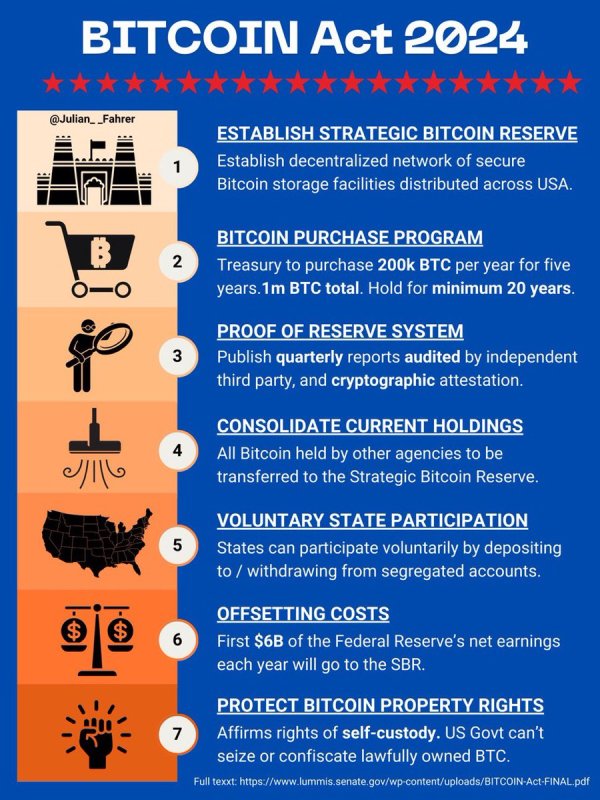Opinion
Silent Payments Are Coming To Better Protect Bitcoin Users
Published
3 months agoon
By
admin

Bitcoin continues to provide a massive breakthrough in the digital age by allowing people to transact between each other without third parties. Bitcoin Magazine covered Silent Payments over two years ago to shed light on one of Bitcoin’s shortcomings: privacy. It was a problem then and it still is today…as stated:
“…a push based payment system (no one is allowed to “pull” payments from you, you have to explicitly authorize them yourself and “push” them to other people), Bitcoin requires the sender to have the information necessary to define the destination for money they send. This requires the recipient communicating to the sender their Bitcoin address in one way or another. In the case of trying to raise money from the general public, this has massive consequences in terms of privacy or needing to maintain a constant interactive presence online. Anyone is totally capable of simply posting a single Bitcoin address somewhere online, and from that point, anyone who wishes to send money to that person can simply do so, but there is no privacy in raising money in this way. Simply take that address and look it up on the blockchain, and you cannot only see how much money that person has been sent, but you can see the footprint on the blockchain of everyone who has sent them money. Both the person attempting to raise funds and everyone who has donated to them have no privacy whatsoever; everything is completely open and correlated for the whole world to see.”
Before Silent Payments, the only alternative was to reuse addresses on a per-contact basis to protect your privacy, or to run a server that offers a new address every time someone requests to send you money. Neither of which are usable or scalable option for most users, reserving privacy for a privileged few who knew how to achieve privacy. Fortunately, the community has made massive progress since then, with the release of Silent Payments.
BIP352 (Silent Payments)
After much discussion on how to implement the feature as efficiently as possible, BIP352 is now a reality. When someone wants to receive money privately, lets say an activist organization, they can post their Silent Payments address on their site instead of a traditional Bitcoin address. Now, when a user wants to send the organization money, they use a Silent Payment address within a supporting wallet. This will automatically use the unique public key attached to the Silent Payment address, combined with the public keys of the outputs they want to send to generate a brand new, single-use address that looks like any other Bitcoin address. It sounds complicated, but all of this functions behind the scenes. All a user needs to do is paste the address and send money to it, just like any other address. There are many benefits:
1) The organization itself only has to post a single address on its site to still receive the benefit of generating new addresses for every transaction.
2) The user sending money to the organization can always reference the same static address, making it easy for them to continually send money without needing to track multiple addresses.
3) If the same user continually gives money to the same Silent Payments address, a new Bitcoin address is generated each time, so the sender doesn’t need to worry about the receiver knowing it’s the same user sending them money.
4) The receiver gains massive privacy benefits as users are not able to easily look into the funds of their wallet and see who else is sending them money.
5) The addresses that are generated to transact between both users appear like any other Bitcoin transaction, meaning use of the feature is obfuscated to outside parties.
6) No server is required. Any wallet that supports Silent Payments handles all this technology locally within the wallet.
To summarize the benefits: With Silent Payments, any person or organization can now opt to using a static Silent Payments Bitcoin address in place of their traditional static address to not only have better privacy for themselves, but it also protects people trying to send them money by ensuring not even they as receivers can snag information about senders. With Silent Payments, the sender and receiver gain a massive layer of privacy, while still largely benefiting from the power of the underlying Bitcoin protocol to give them the freedom to transact as they please.
With that said, there are drawbacks. The first is a direct result of the benefit of not needing a dedicated device online to facilitate the transactions. Users will need to scan through blockchain transactions to detect payments made to them. This scanning can take time, but it comes with massive privacy benefits for both users. Over time, performance of scanning can also be improved to make this less of an issue for users.
The second issue is one of adoptability, since Silent Payments are new with wallet support being fairly limited at the time of writing. Both the sender and receiver need to use a wallet that offers support for the feature. silentpayments.xyz is a resource that shares which wallets support Silent Payments, the first of which
to currently have full support being Cake Wallet. If the community hopes to see wider adoption of Silent Payments, wallets need to integrate the functionality to offer more users the privacy benefits provided by Bitcoin Silent Payments.
Overall the idea of protecting user privacy through the native Bitcoin protocol is an important one that can offer user privacy without jeopardizing what makes Bitcoin, Bitcoin. In fact, the privacy benefits of Silent Payments strengthen the fundamental beliefs of the Bitcoin community by offering users the freedom to transact with better privacy if they choose to.
This is a guest post by Henry Fisher. Opinions expressed are entirely their own and do not necessarily reflect those of BTC Inc or Bitcoin Magazine.
Source link
You may like


Microsoft Should Buy $78 Billion Worth of Bitcoin


Ethereum Believers May Be Staring Down Opportunity As ETH Reaches Another Low Against Bitcoin: CryptoQuant CEO


UK government is ready for crypto regulations next year


“Crypto Dad” Chris Giancarlo Emerges Top For White House Crypto Czar Role


Bitcoin Nears $100,000 As Trump Council Expected To Implement BTC Reserve


Know Your Missiles: Russia’s Experimental Hypersonic Missile Is A New Kind of Killing Machine
Michael Saylor
Microsoft Should Buy $78 Billion Worth of Bitcoin
Published
1 hour agoon
November 22, 2024By
admin


As someone who has used Microsoft products my whole life, it pains me to see they are fumbling the bag on Bitcoin. The company’s $78 billion in cash reserves are losing value daily. Meanwhile, they stubbornly refuse to follow MicroStrategy’s proven winning strategy — convert those melting dollars to scarce Bitcoin!
Microsoft announced a couple of months ago that it would buy back shares up to $60 billion; it seems like this did nothing to increase the stock price. Imagine if they had bought Bitcoin instead. That money would have been much more powerful if allocated to Bitcoin. The company would likely have added hundreds of billions in market cap.
Just look at MicroStrategy. In just four years, they turned their $1 billion company into $100 billion by adopting Bitcoin as a treasury reserve asset. They are now the most compelling and successful story in corporate finance, with the best-performing stock in the last four years, beating every US company – even NVIDIA.
Yet Microsoft clings to an outdated financial strategy, destroying shareholder value. Microsoft should follow its technology instincts, not faulty financial logic. There is no long-term viability in holding cash.
I was listening to X Spaces yesterday, during which MicroStrategy’s CEO Michael Saylor revealed that he offered to explain Bitcoin’s benefits privately, but Microsoft’s CEO Satya Nadella rejected the meeting. Now, he is making a last-ditch appeal by presenting a 3-minute Bitcoin proposal to Microsoft’s board.
Earlier, the board already advised shareholders to reject assessing Bitcoin’s potential upside. Nonetheless, I am interested to see how this meeting will turn out. Saylor is a great educator, so you never know.
They should realise that no corporate treasury asset like Bitcoin can enhance enterprise value. Even a small $5 billion Bitcoin allocation could add tens of billions in market cap.
Look, Microsoft, the choice is clear – hoard melting dollars or embrace uncensorable digital gold. Your shareholders are begging you to buy Bitcoin. It’s time to listen before that $78 billion completely disappears. This is your fiduciary duty as Bitcoin continues mass adoption.
This article is a Take. Opinions expressed are entirely the author’s and do not necessarily reflect those of BTC Inc or Bitcoin Magazine.
Source link
$100
Bitcoin Nears $100,000 As Trump Council Expected To Implement BTC Reserve
Published
5 hours agoon
November 22, 2024By
admin

What an enormous day it has been today.
Gary Gensler officially announced that he is stepping down from his position as Chairman of the Securities and Exchange Commission (SEC), and minutes later, Reuters reported that Donald Trump’s “crypto council” is expected to “establish Trump’s promised bitcoin reserve.” A bitcoin reserve, that would see the United States purchase 200,000 bitcoin per year, for five years until it has bought 1,000,000 bitcoin.

Right after both of those, Bitcoin continued its upward momentum and broke $99,000, with $100,000 feeling like it can happen at any second now.
It is hard to contain my bullishness thinking about the United States purchasing 200,000 BTC per year. They essentially have to compete with everyone else in the world who is also accumulating bitcoin and attempting to front run them. There are only 21 million bitcoin and that is a LOT of demand.
To put this into context, so far this year the US spot bitcoin ETFs have accumulated a combined total of over 1 million BTC. At the time of launch the price was ~$44,000 and now bitcoin is practically at $100,000. And that’s all ETFs combined. Imagine what will happen when just one entity wants to buy a total of 1 million coins, having to compete with everyone else accumulating large amounts as well?
I mean MicroStrategy literally just completed another $3 BILLION raise to buy more bitcoin, and will continue raising until it purchases $42 billion more in bitcoin. The United States are most likely going to be purchasing their coins (if this legislation is officially signed into law) at very high prices. The demand is insane and only rising in the foreseeable future.
With two months left to go until Trump officially takes office, it remains to be seen if this bill becomes law, but at the moment things are looking really good. As Senator Cynthia Lummis stated, “This is our Louisiana Purchase moment!” and would be an absolutely historic moment for Bitcoin, Bitcoiners, and the future financial dominance of the United States of America.
This is the solution.
This is the answer.
This is our Louisiana Purchase moment!#Bitcoin2024 pic.twitter.com/RNEiLaB16U
— Senator Cynthia Lummis (@SenLummis) July 27, 2024
This article is a Take. Opinions expressed are entirely the author’s and do not necessarily reflect those of BTC Inc or Bitcoin Magazine.
Source link
Bitcoin Policy
Want Greater Bitcoin Adoption? Engage With Your Government.
Published
10 hours agoon
November 21, 2024By
admin

It’s been a good week for Bitcoin and its status in the eyes of federal deposit insurance corporations. (Well, there’s a weird sentence I never thought I’d write.)
On Tuesday, the anti-crypto U.S. Federal Deposit Insurance Corporation (FDIC) Chairman, Martin Gruenberg, announced he’d be stepping down in January.
And yesterday, Heritage Falodun, CEO of DigiOats, Nigeria’s leading Bitcoin education and consultancy platform, educated members of the Nigeria Deposit Insurance Corporation (NDIC) about the benefits of bitcoin and other digital assets.
Falodun, an indefatigable Bitcoin proponent, spearheaded a seminar for the NDIC entitled “Cryptocurrency in the Evolving Financial Industry”.
This week, @DigiOats alongside with #MassCyberTech completed a groundbreaking seminar for @NDICNigeria 🇳🇬on “Cryptocurrency in the Evolving Financial Industry”. We explored #Bitcoin adoption, regulation, and sustainable finance marking a key moment for Nigeria’s financial future pic.twitter.com/hpWQOqZt8L
— DigiOats⚡️ (@DigiOats) November 21, 2024
In it, he highlighted the following points:
- Bitcoin can serve as a reserve asset for nation states, including Nigeria
- Using bitcoin (and other digital assets), banks can reduce settlement time
- Bitcoin can reduce capital controls, as its censorship resistant
Falodun and his team also provided an overview on the evolution of money and financial systems and also touched on the ways in which bitcoin and crypto are already integrated into traditional financial structures in efforts to convince the NDIC of Bitcoin and crypto’s importance.
“Nigeria must adopt balanced regulations that protect citizens and foster innovation,” Falodun told Bitcoin Magazine. “By embracing Bitcoin’s uniqueness and engaging the Bitcoin community, Nigeria can lead the global financial revolution.”
Falodun knows that without properly educating government officials, Bitcoin runs the risk of being misunderstood and, therefore, regulated improperly.
“I would like regulators to understand that Bitcoin’s decentralized nature is not a flaw to be regulated out of existence, but a feature that offers unprecedented opportunities for inclusion, economic freedom and optimization of financial rails,” he added.
I respect Falodun’s efforts.
Before you go calling me a statist or some other silly reductive term, I’d like to remind you that even well-known cypherpunks like Adam Back have said that part of the struggle around greater Bitcoin adoption (and encryption in general) will include engaging with governments (and courts).
Proponents of Bitcoin should acknowledge our current political reality and make the case for Bitcoin to those in power if they want to see it flourish — or if they want to at least stop governments from crafting poor policy around Bitcoin and/or attacking the industry.
Take a cue from Falodun and do your part to educate local government officials, members of state-level administrative agencies or even Federal-level bureaucrats about Bitcoin.
It’s one of the most important things you can do to keep your country from falling behind.
Source link

Microsoft Should Buy $78 Billion Worth of Bitcoin

Ethereum Believers May Be Staring Down Opportunity As ETH Reaches Another Low Against Bitcoin: CryptoQuant CEO

UK government is ready for crypto regulations next year

“Crypto Dad” Chris Giancarlo Emerges Top For White House Crypto Czar Role

Bitcoin Nears $100,000 As Trump Council Expected To Implement BTC Reserve

Know Your Missiles: Russia’s Experimental Hypersonic Missile Is A New Kind of Killing Machine

Polkadot investor predicts a 30,000% rally for this $0.04 token by 2025

Donald Trump Proposed Crypto Advisory Council To Set Up Strategic Bitcoin Reserve

Want Greater Bitcoin Adoption? Engage With Your Government.

Why the Media Loves the Worst of Crypto

HashCats prepares for Token Generation Event after completing mining season

Gary Gensler To Step Down As US SEC Chair In January

The Chart That Shows Bitcoin’s Bull Run Won’t Stop at $100,000

$2 Million PEPE Purchase Sees 105 Billion Tokens Snapped Up

XRP price expected to reach $7, Dogecoin $3, and PCHAIN $1 from $0.004
182267361726451435

Top Crypto News Headlines of The Week

Why Did Trump Change His Mind on Bitcoin?

New U.S. president must bring clarity to crypto regulation, analyst says

Ethereum, Solana touch key levels as Bitcoin spikes

Bitcoin Open-Source Development Takes The Stage In Nashville

Will XRP Price Defend $0.5 Support If SEC Decides to Appeal?

Bitcoin 20% Surge In 3 Weeks Teases Record-Breaking Potential

Ethereum Crash A Buying Opportunity? This Whale Thinks So

Shiba Inu Price Slips 4% as 3500% Burn Rate Surge Fails to Halt Correction

‘Hamster Kombat’ Airdrop Delayed as Pre-Market Trading for Telegram Game Expands

Washington financial watchdog warns of scam involving fake crypto ‘professors’

Citigroup Executive Steps Down To Explore Crypto
Mostbet Güvenilir Mi – Casino Bonus 2024

Bitcoin flashes indicator that often precedes higher prices: CryptoQuant
Trending

 2 months ago
2 months ago182267361726451435

 24/7 Cryptocurrency News3 months ago
24/7 Cryptocurrency News3 months agoTop Crypto News Headlines of The Week

 Donald Trump4 months ago
Donald Trump4 months agoWhy Did Trump Change His Mind on Bitcoin?

 News3 months ago
News3 months agoNew U.S. president must bring clarity to crypto regulation, analyst says

 Bitcoin4 months ago
Bitcoin4 months agoEthereum, Solana touch key levels as Bitcoin spikes

 Opinion4 months ago
Opinion4 months agoBitcoin Open-Source Development Takes The Stage In Nashville

 Price analysis3 months ago
Price analysis3 months agoWill XRP Price Defend $0.5 Support If SEC Decides to Appeal?

 Bitcoin4 months ago
Bitcoin4 months agoBitcoin 20% Surge In 3 Weeks Teases Record-Breaking Potential



